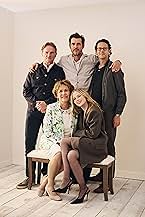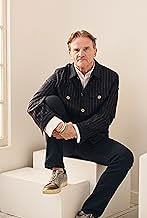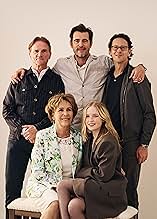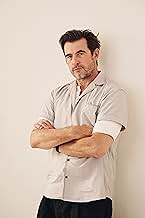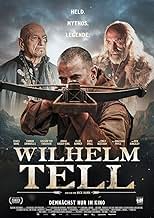Nella Svizzera del XIV secolo, un cacciatore un tempo pacifico guida il suo popolo alla ribellione dopo che la sua famiglia e il suo paese sono stati minacciati da un tirannico re austriaco.Nella Svizzera del XIV secolo, un cacciatore un tempo pacifico guida il suo popolo alla ribellione dopo che la sua famiglia e il suo paese sono stati minacciati da un tirannico re austriaco.Nella Svizzera del XIV secolo, un cacciatore un tempo pacifico guida il suo popolo alla ribellione dopo che la sua famiglia e il suo paese sono stati minacciati da un tirannico re austriaco.
- Premi
- 1 candidatura in totale
Riepilogo
Reviewers say 'William Tell' is lauded for its strong performances, stunning cinematography, and historical authenticity. The narrative of rebellion against tyranny resonates, though dialogue and pacing receive mixed feedback. Some find the script theatrical, and the middle section drags. Historical accuracy and character portrayals are debated. Despite these issues, the film's epic scope and emotional depth make it a compelling historical drama.
Recensioni in evidenza
To all the naysayers sharpening their quills, let's get real: William Tell isn't trying to be Braveheart 2.0 (and thank goodness-no one needs another freedom speech in blue face paint). Instead, this film carves out its own niche with a crossbow and a wink.
Sure, some critics are acting like Tell missed the apple and shot their popcorn instead. But let's give credit where it's due: Claes Bang brings more charisma to the Swiss Alps than Mel Gibson brought to the Scottish Highlands. The villains are deliciously over-the-top-Ben Kingsley could probably glare a mountain goat into submission-and the scenery is so gorgeous you'll want to book a flight to Switzerland (or at least Google it).
Is it perfect? No. But neither is Braveheart (historical accuracy, anyone?). If you're looking for a fun, action-packed legend with a dash of heart and a lot less kilt, William Tell hits the mark. So loosen up, critics-sometimes a movie is just a good time, not a history lesson or a revolution.
Let me know if you want more zingers or specific references!
Sure, some critics are acting like Tell missed the apple and shot their popcorn instead. But let's give credit where it's due: Claes Bang brings more charisma to the Swiss Alps than Mel Gibson brought to the Scottish Highlands. The villains are deliciously over-the-top-Ben Kingsley could probably glare a mountain goat into submission-and the scenery is so gorgeous you'll want to book a flight to Switzerland (or at least Google it).
Is it perfect? No. But neither is Braveheart (historical accuracy, anyone?). If you're looking for a fun, action-packed legend with a dash of heart and a lot less kilt, William Tell hits the mark. So loosen up, critics-sometimes a movie is just a good time, not a history lesson or a revolution.
Let me know if you want more zingers or specific references!
The 2024 adaptation of William Tell arrives with grandeur in mind, positioning itself as a sweeping retelling of the legendary Swiss folk hero known for his defiance against tyranny and unmatched archery skills. The source material is rich, filled with tension, rebellion, and moral weight. Unfortunately, while this version boasts meticulous costuming and visual authenticity, the film itself proves to be an uninspired and emotionally muted experience that drags more than it compels.
From the opening scenes, it is clear that a significant amount of effort was poured into the look of the film. The costumes are easily one of the highlights. Each garment feels appropriately weathered and era-specific, transporting viewers into a believable medieval Alpine world. The armor, the peasants' clothing, and the noble attire all feel right, not just in terms of aesthetics but in their contribution to the sense of place and time. This level of authenticity suggests a production that took historical detail seriously, a commendable trait in any period film.
But the visuals cannot save what is otherwise a directionless and emotionally flat experience. The acting is consistently muted across the board. While restraint can often be a powerful choice in performance, especially in dramatic historical epics, the cast here often feels detached rather than intentional. William Tell, played by a well-known but oddly miscast lead, offers little in terms of emotional engagement. His performance is subdued to the point of seeming uninterested. Even in moments where righteous fury or internal conflict should dominate the screen, there is a quiet monotone that dulls what should be the pulse of the story.
Supporting characters fare no better. The villainous bailiff Gessler, who forces Tell to shoot an apple off his son's head, comes across more as a bureaucratic inconvenience than a terrifying symbol of oppression. And Tell's son, Walter, is particularly jarring. While the child actor speaks his lines clearly enough, the character feels like a transplant from a contemporary teen drama. He comes off as a whiny, modern-day, spoiled brat rather than a child raised in a time of oppression and hardship. His tone and behavior are out of step with the film's setting and drain any real gravity from the film's most iconic scene. Rather than evoking sympathy or concern, his presence often irritates, further weakening the emotional heart of the film.
If there is a single word that best describes the film's direction, it is aimless. The pacing is sluggish and the scenes often feel stitched together without momentum or narrative drive. Dialogue-heavy moments linger far too long, and action sequences-few and far between-are choreographed without urgency. Tension, which should build steadily in a story of resistance and personal courage, instead dissipates into long, quiet stares and slowly spoken monologues that offer little substance.
The script also bears responsibility for the film's failings. The dialogue is overly formal and lacks emotional punch. Characters speak in a kind of flattened Shakespearean dialect, which may have been intended to lend gravitas but instead sounds stilted and unnatural. There is an absence of internal conflict, personal stakes, or even basic emotional variation. The result is a story that is both unconvincing and unengaging.
The direction, or lack thereof, further exacerbates the film's weaknesses. Scenes are blocked in a way that feels static and stagey. Characters frequently stand still or walk in slow circles while delivering their lines, as though unsure of what to do. There is no clear visual language or thematic rhythm to guide the viewer. The camera work is competent, even beautiful at times, especially in wide alpine shots, but the cinematography never communicates anything deeper than surface-level beauty.
It is particularly disheartening because the legend of William Tell should not be this dull. This is a story of resistance against authoritarianism, of one man's courage and conviction challenging the rule of law and power. The famous apple scene is one of the most enduring symbols of precision and pressure in Western folklore, and yet here it passes with barely a pulse. The build-up is too long, the staging too clinical, and the aftermath too emotionally blank to do justice to what should be the film's most riveting moment.
Even the score, while serviceable, does not elevate the experience. There are moments when the music swells with the landscape, offering fleeting glimpses of grandeur, but more often than not it simply underlines the sluggish tempo rather than providing contrast or emotional cues.
To be fair, the filmmakers clearly had ambition. There is a reverence for the legend at play, and a clear attempt to treat the material seriously. But reverence alone does not make for compelling cinema. A myth as potent and symbolic as William Tell's demands energy, risk, and a sense of rebellion. This film plays it far too safe, choosing to meditate rather than ignite.
The final act attempts a return to narrative urgency but arrives too late. The resolution feels both rushed and unsatisfying, offering little payoff for the patience demanded throughout the preceding two hours. Characters who should experience transformation remain static. The revolution hinted at never fully materializes in any believable way. It ends with a whimper rather than a bang, and the audience is left not with a sense of triumph, but a question: what was the point?
In the end, William Tell (2024) is a missed opportunity. The craftsmanship is visible in its wardrobe and scenic backdrops, but the emotional core of the story is hollow. Its performances are subdued to the point of disengagement, and its direction lacks vision. A film with this much potential, based on such a powerful legend, should have stirred hearts and quickened pulses. Instead, it leaves viewers checking the time and waiting for something-anything-to happen.
For fans of historical costume dramas, the film might hold some visual appeal, but even those with patience for slow burns may find their endurance tested here. This version of William Tell is not without merit, but it ultimately forgets that the tale is one of bravery and defiance. What we get is a beautiful shell of a story, impeccably dressed but sadly empty inside.
From the opening scenes, it is clear that a significant amount of effort was poured into the look of the film. The costumes are easily one of the highlights. Each garment feels appropriately weathered and era-specific, transporting viewers into a believable medieval Alpine world. The armor, the peasants' clothing, and the noble attire all feel right, not just in terms of aesthetics but in their contribution to the sense of place and time. This level of authenticity suggests a production that took historical detail seriously, a commendable trait in any period film.
But the visuals cannot save what is otherwise a directionless and emotionally flat experience. The acting is consistently muted across the board. While restraint can often be a powerful choice in performance, especially in dramatic historical epics, the cast here often feels detached rather than intentional. William Tell, played by a well-known but oddly miscast lead, offers little in terms of emotional engagement. His performance is subdued to the point of seeming uninterested. Even in moments where righteous fury or internal conflict should dominate the screen, there is a quiet monotone that dulls what should be the pulse of the story.
Supporting characters fare no better. The villainous bailiff Gessler, who forces Tell to shoot an apple off his son's head, comes across more as a bureaucratic inconvenience than a terrifying symbol of oppression. And Tell's son, Walter, is particularly jarring. While the child actor speaks his lines clearly enough, the character feels like a transplant from a contemporary teen drama. He comes off as a whiny, modern-day, spoiled brat rather than a child raised in a time of oppression and hardship. His tone and behavior are out of step with the film's setting and drain any real gravity from the film's most iconic scene. Rather than evoking sympathy or concern, his presence often irritates, further weakening the emotional heart of the film.
If there is a single word that best describes the film's direction, it is aimless. The pacing is sluggish and the scenes often feel stitched together without momentum or narrative drive. Dialogue-heavy moments linger far too long, and action sequences-few and far between-are choreographed without urgency. Tension, which should build steadily in a story of resistance and personal courage, instead dissipates into long, quiet stares and slowly spoken monologues that offer little substance.
The script also bears responsibility for the film's failings. The dialogue is overly formal and lacks emotional punch. Characters speak in a kind of flattened Shakespearean dialect, which may have been intended to lend gravitas but instead sounds stilted and unnatural. There is an absence of internal conflict, personal stakes, or even basic emotional variation. The result is a story that is both unconvincing and unengaging.
The direction, or lack thereof, further exacerbates the film's weaknesses. Scenes are blocked in a way that feels static and stagey. Characters frequently stand still or walk in slow circles while delivering their lines, as though unsure of what to do. There is no clear visual language or thematic rhythm to guide the viewer. The camera work is competent, even beautiful at times, especially in wide alpine shots, but the cinematography never communicates anything deeper than surface-level beauty.
It is particularly disheartening because the legend of William Tell should not be this dull. This is a story of resistance against authoritarianism, of one man's courage and conviction challenging the rule of law and power. The famous apple scene is one of the most enduring symbols of precision and pressure in Western folklore, and yet here it passes with barely a pulse. The build-up is too long, the staging too clinical, and the aftermath too emotionally blank to do justice to what should be the film's most riveting moment.
Even the score, while serviceable, does not elevate the experience. There are moments when the music swells with the landscape, offering fleeting glimpses of grandeur, but more often than not it simply underlines the sluggish tempo rather than providing contrast or emotional cues.
To be fair, the filmmakers clearly had ambition. There is a reverence for the legend at play, and a clear attempt to treat the material seriously. But reverence alone does not make for compelling cinema. A myth as potent and symbolic as William Tell's demands energy, risk, and a sense of rebellion. This film plays it far too safe, choosing to meditate rather than ignite.
The final act attempts a return to narrative urgency but arrives too late. The resolution feels both rushed and unsatisfying, offering little payoff for the patience demanded throughout the preceding two hours. Characters who should experience transformation remain static. The revolution hinted at never fully materializes in any believable way. It ends with a whimper rather than a bang, and the audience is left not with a sense of triumph, but a question: what was the point?
In the end, William Tell (2024) is a missed opportunity. The craftsmanship is visible in its wardrobe and scenic backdrops, but the emotional core of the story is hollow. Its performances are subdued to the point of disengagement, and its direction lacks vision. A film with this much potential, based on such a powerful legend, should have stirred hearts and quickened pulses. Instead, it leaves viewers checking the time and waiting for something-anything-to happen.
For fans of historical costume dramas, the film might hold some visual appeal, but even those with patience for slow burns may find their endurance tested here. This version of William Tell is not without merit, but it ultimately forgets that the tale is one of bravery and defiance. What we get is a beautiful shell of a story, impeccably dressed but sadly empty inside.
Hmmm. Never before have I heard anyone proudly declare "We are Swiss" in quite such an underwhelming manner before, and that rather sums up the lacklustre performance of Claes Bang as the title character in this verbose crossbow chronology. Traumatised by his experiences in the Crusade, he's now not a natural rebel but is instead content to live peaceably with his wife and son. When he comes to the rescue of a stranger whose wife had just been raped and murdered by the occupying troops of the King of Austria (Sir Ben Kingsley) his former valiance is rekindled and releases all manner of hell on his unprepared, unarmed and unsuspecting people. Pursued by the maniacal "Gessler" (Connor Swindell) and his blonde henchman "Stussi" (Jake Dunn), he has to rediscover his skill with the arrow, and yes - there's the legendary scene with the apple and the boy's head! There is some stunning Alpine photography mingled in with the pretty obvious CGI, and to be fair to it there are plenty of action scenes as Tell and his rapidly increasing circle of friends proves to be quite adept at reducing their foes to wriggling corpses. Sir Ben has managed to fish out his eye patch from "The Last Legion" (2007) but like Sir Jonathan Pryce, he doesn't really feature enough to make much more than a few cameo appearances to add a little bit of Thespian gravitas to this rather sterile and flat history. The characters are really lacking in charisma in this film and the long-winded dialogue and charm-free efforts from all but, perhaps, Dunn - think a weedier version of "Stamper" from "Tomorrow Never Dies" (1997) just don't really resonate much at all. There's plenty of attention to the creative detail with the costumes and castles all fitting the bill nicely but it's probably half an hour longer than it needs to be and screams sequel at us at it's all rather rushed end.
I watched the world premiere of William Tell at the Toronto International Film Festival (2024).
The presenter of the festival had said before the movie, "they don't make movies like this anymore". I assumed that was a positive thing.
Unfortunately, it really wasn't. The biggest issue of the movie was the language used.
This is a 14th-century period piece that involved the Swiss and Austrians. But for whatever reason the dialogue was written in something that sounded like a high-schooler's approximation of Victorian English.
According to the director, he wrote the dialogue to have language unique to the film. Maybe to assist in some sense of believability within this world. Instead the film was often hard to follow. Character motivations were lost in the flowery, disjointed language.
That being said - the cast did their absolute best with the film. Golshifteh Farahani, Connor Swindells, Rafe Spall, and Ellie Bamber were standouts.
Don't go to see the film for Ben Kingsley - he was barely in it and his performance felt completely phoned in.
If you're okay with 2-hours of mindlessness as you watch beautiful scenery and cool fight scenes - I think there is enough to enjoy.
The movie set up a sequel. I do hope it can be made, and some changes to how dialogue and character interactions are done will be made.
The presenter of the festival had said before the movie, "they don't make movies like this anymore". I assumed that was a positive thing.
Unfortunately, it really wasn't. The biggest issue of the movie was the language used.
This is a 14th-century period piece that involved the Swiss and Austrians. But for whatever reason the dialogue was written in something that sounded like a high-schooler's approximation of Victorian English.
According to the director, he wrote the dialogue to have language unique to the film. Maybe to assist in some sense of believability within this world. Instead the film was often hard to follow. Character motivations were lost in the flowery, disjointed language.
That being said - the cast did their absolute best with the film. Golshifteh Farahani, Connor Swindells, Rafe Spall, and Ellie Bamber were standouts.
Don't go to see the film for Ben Kingsley - he was barely in it and his performance felt completely phoned in.
If you're okay with 2-hours of mindlessness as you watch beautiful scenery and cool fight scenes - I think there is enough to enjoy.
The movie set up a sequel. I do hope it can be made, and some changes to how dialogue and character interactions are done will be made.
Had to turn it off after so many sea voyages which appeared to be made out as a if they were on the North Sea. Between Switzerland and Austria? Awful. While this was dreadful and mind numbing even as a bit of background noise it became too much to cope with. Not sure why reviews have to be so long so again I'll just say don't bother. Walk your dog for the 5th time today go to the toilet, even if you don't need to. You can read the ingredients on the shampoo bottle, It'll be more entertaining even if you know them word for word. Then move onto the shower gell. Enough words almost now. It's awful cheers.
Lo sapevi?
- QuizDespite being a national hero in Switzerland, there is no concrete historical evidence that William Tell ever existed.
The earliest written account of the story appears in a 15th-century chronicle called the "White Book of Sarnen", more than a century after the events are supposed to have taken place.
Furthermore, the act of the hero shooting an apple from his son's head stems from the saga of Toko, who was a servant of the Danish King Harald Bluetooth, who died in 985. Likewise, Toko's story was written down more than two hundred years later, in the epic tale "Gesta Danorum".
Many historians view William Tell as a purely legendary figure, though his story was deeply embedded in Swiss national identity by the time of its writing.
- BlooperThe various castles are shown in their modern forms. Specifically, they have a large number of windows. These were all cut several centuries after the period in which the story is set, when castles were no longer required to be fortresses.
- ConnessioniVersion of Guillaume Tell et le clown (1898)
I più visti
Accedi per valutare e creare un elenco di titoli salvati per ottenere consigli personalizzati
Everything New on Hulu in August
Everything New on Hulu in August
There's a whole lot to love about Hulu's streaming offerings this month — get excited for brand-new series premieres and film favorites to watch at home.
- How long is William Tell?Powered by Alexa
Dettagli
Botteghino
- Lordo Stati Uniti e Canada
- 43.088 USD
- Fine settimana di apertura Stati Uniti e Canada
- 26.554 USD
- 6 apr 2025
- Lordo in tutto il mondo
- 680.624 USD
- Tempo di esecuzione
- 2h 14min(134 min)
- Colore
- Mix di suoni
- Proporzioni
- 2.39 : 1
Contribuisci a questa pagina
Suggerisci una modifica o aggiungi i contenuti mancanti


